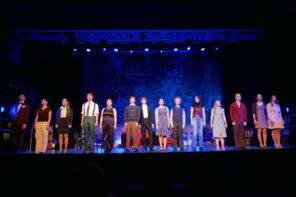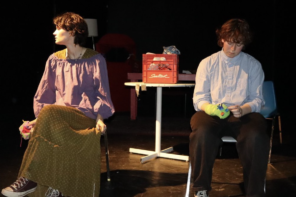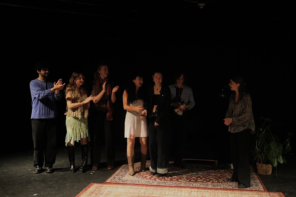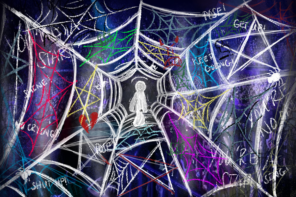Content warning: themes and mention of suicide, abortion, domestic violence, homophobic slurs, and PTSD.
for coloured girls who have considered suicide/when the rainbow is enuf is Tuesday Night Cafe Theatre’s second production of the year, and Munyaradzi Guramatunhu’s directorial debut.
Written by poet and playwright Ntozake Shange, “For Coloured Girls” is a choreopoem: a collection of poetic monologues, interspersed with music and dance. The six main characters, all black women, narrate Shange’s stories based on racism, sexism, and oppression. “For Coloured Girls” pulls no punches in its content; subjects include rape, abortion, and domestic violence. Less controversially, but no less powerfully, subjects like infidelity, femininity, and sisterhood are also explored. Though there are moments of hope and empowerment, theatregoers should be aware that for every scene that puts a smile on your face, there are three that put a lump in your throat.
What makes For Coloured Girls so great? For starters, the poetry itself is stunning. Shange’s writing is a brutally honest introspective into black womanhood. In Guramatunhu’s words, black women live in “the intersection of the bottom,” subjugated by both race and gender. Consequently, the stories in For Coloured Girls present a distinct perspective from a distinct identity. Despite this narrow viewpoint, the themes they explore are universal: what is it like for women in relationships? How does it feel to be cheated on? What is it like to love, to lose, and to grieve? Lorna Kidjo (Woman in Yellow) says that For Coloured Girls has something for everyone, because “to a certain degree, every woman and every person has been through something similar.”
While For Coloured Girls is created and put on by black women, it is not intended to be viewed only by black women.
First-time director Guramatunhu took on an immense challenge by choosing a production with so little in the way of stage direction and previous adaptations to draw from. Shange’s writing does not even include punctuation, so each scene took considerable vision and creativity to bring from page to stage. Guramatunhu says that she took advantage of her tabula rasa, and many of her staging ideas came straight from conversations with the cast and their opinions and interpretations of Shange’s words.
It’s the brilliant cast that brings the poetry of For Coloured Girls to life. It’s hard to single any one actress out, not only because they’re all incredible, but because For Coloured Girls is a collective piece. Indeed, the onstage chemistry between the actresses is clear, as well as their genuine off-stage friendship, or ‘sisterhood’ as they call it. However, there are some standouts who can’t go unmentioned. Keren Roberts as the Lady in Blue and Jamila Joseph as the Lady in Purple are both convincing and their scenes run the gamut from lighthearted to gut-wrenching. Benita Bailey is magnetic as the Lady in Red, consistently bringing ferocity and intensity to her scenes. These three are also charged with the most emotional scenes, and carry them incredibly well. But it’s when the actresses are together and feeding off each other that they are truly at their greatest. The ensemble scenes are the most emphatic display of the sisterly solidarity that For Coloured Girls is about. While each woman shines on her own, it is when she is together with her sisters that she and they are truly resplendent. In Guratamunhu’s words, “each colour is a different woman, but every colour is also a facet of the same woman.”
Beyond its success in production and acting, For Coloured Girls is a triumph as McGill’s first black production. For Coloured Girls is written, directed, performed, and produced entirely by black women. This feat is not just impressive within McGill boundaries, but immensely important to the world of theatre and entertainment at large. The entertainment industry is plagued by minority under-representation and whitewashing. These phenomena are endemic at the top levels, but this systematic barrier is built from the bottom-up. The lack of minority representation begins when people of colour are discouraged from participating in the arts from a young age. This is why, according to Ines Vieux Francouer (Lady in Green), For Coloured Girls should be watched by “every little black girl who never saw herself in theatre.”
‘A large part of putting on this production was the lack of representation at McGill.’
Guramatunhu foresaw that casting would be a challenge at McGill, where the student population is already predominantly Caucasian, and the theatre community even more so. To overcome this, Guramatunhu collaborated with the Black Student Network at McGill, and with the Black Theatre Workshop, a theatre organization based in Montreal. Of the six cast members, only Vieux Francouer is a McGill student. Guramatunhu isn’t discouraged by this, however, saying, “a large part of putting on this production was the lack of representation at McGill.” She says that “you have to do it for yourself, by yourself, for everyone to see,” and hopes that by putting on an all-black production, she can “get the black actors of McGill to see that it’s possible… and come out of the shadows.”
While For Coloured Girls is created and put on by black women, it is not intended to be viewed only by black women. The cast agrees that it’s extremely important that For Coloured Girls’ viewership isn’t limited to who it represents. They want the play to be a means for non-black, non-female people to see, listen, and experience life from this perspective. The title alone may alienate and discourage non-black, non-female population. This is something that Guramatunhu has thought of, and in response, she says, “This play is not for you, but that is why it is for you. This production is an act of therapy for everyone involved, and for everyone it isn’t an act of therapy for, it is one of the most educational pieces you can watch.”
for coloured girls who have contemplated suicide/when the rainbow is enuf is on from November 15th-18th and 22nd-25th at TNC Theatre in Morrice Hall. There will be talk-back sessions after Friday performances. Tickets are $6 for students and QDF card-holders and $10 at the door.










hi there…what time are the shows specifically the 25th. Didn’t see it mentioned anywhere. Thx